Policing 'damaged' after Stephen Lawrence report
- Published
Home Secretary Theresa May: "Only a public inquiry will be able to get at the full truth"
Policing stands damaged after the findings of a review into the Stephen Lawrence murder investigation, Home Secretary Theresa May has said.
A report found a Metropolitan Police officer spied on the Lawrence family, and it did not rule out that corruption may have compromised the investigation.
Mrs May said some undercover operations could have led to wrongful convictions and miscarriages of justice.
She also announced a judge-led public inquiry into undercover policing.
Stephen Lawrence, who was 18, was stabbed to death in an unprovoked attack by a gang of white youths in Eltham, south-east London, in April 1993.
'Still deplorable'
Mrs May addressed the House of Commons on the findings in the report by Mark Ellison QC, external.
She said the actions of undercover officers - such as failing to reveal their true identities to court or correct evidence they knew was wrong - meant there was "real potential for miscarriages of justice".
"Policing stands damaged today. Trust and confidence in the Metropolitan Police and policing more generally is vital," she said.
"A public inquiry and the other work I have set out are part of the process of repairing the damage.
"Stephen Lawrence was murdered over 20 years ago and it is still deplorable that his family have had to wait so many years for the truth to emerge."
Doreen Lawrence: "Clearly, we weren't the problem - the Met was the problem"
Mrs May said she had commissioned Mr Ellison, and the Crown Prosecution Service and attorney general, to conduct a further review into cases involving Scotland Yard's undercover Special Demonstrations Squad (SDS).
She said: "In particular, Ellison says there is an inevitable potential for SDS officers to have been viewed by those they infiltrated as encouraging, and participating in, criminal behaviour. We must therefore establish if there have been miscarriages of justice."
Labour former home secretary Jack Straw responded: "I have to say to you in the 35 years I've been in this House, this is one of the most shocking and serious statements I've heard by any minister from any party."
Shadow home secretary Yvette Cooper said: "Twenty-one years later no one should underestimate the gravity of the institutional failure two decades ago but also the continued institutional failure to get to the truth and the seriousness of this."
Prime Minister David Cameron tweeted: "Like the Home Secretary, I find the conclusions of the Stephen Lawrence review profoundly shocking. It's important we have a full inquiry."
Mrs May said:
A new criminal offence of police corruption would replace the current "outdated" misconduct in public office
She had asked Chief Inspector of Constabulary Tom Winsor to look at the anti-corruption capabilities of police forces, including professional standards departments
There would be a "forensic external review" of the exact role the Home Office played in relation to the SDS
She had asked the director of the National Crime Agency to look at how to investigate the allegations in Mr Ellison's findings
Following the Ellison report's publication on Thursday, Stephen's mother Baroness Lawrence described the latest revelations as the "final nail in the coffin" and said those involved should resign for their "disgraceful" actions.
"You can't trust them. Still to this day. Trust and confidence in the Met is going to go right down," she said.
Stephen's father Neville Lawrence said the report's findings were "21 years overdue".
Mr Ellison's report said that in 1993, at the cost of "millions of pounds", the then Met Commissioner Paul Condon authorised a "top secret anti-corruption intelligence initiative" called Operation Othona.
It operated "fully outside" the Met, gathering intelligence by "various sensitive and covert means" from 1994 to 1998.
The report said the Met "has been unable to locate" the Operation Othona intelligence that existed by 1998, with the exception of a hard drive created in 2001 and found in a cardboard box in 2013 at the Met's Directorate of Professional Standards.
"We have very recently been informed that in 2003 there was 'mass shredding' of the surviving hard copy reports generated by Operation Othona," the report added.
It said the "chaotic state" of Met Police records meant a public inquiry might have "limited" potential to find out more information.
The undercover officer in question, who has not been named in Mr Ellison's report, was deployed by the SDS.
Neville Lawrence: "You shouldn't have to go through something like this twice"
The squad, which operated until 2006, deployed officers into activist groups which then sought to attach themselves to the Lawrence family campaign for justice over the killing.
Mr Ellison said: "The mere presence of an undercover Metropolitan Police officer in the wider Lawrence family camp in such circumstances is highly questionable in terms of the appearance it creates of the MPS [Metropolitan Police Service] having a spy in the family's camp."
The Ellison report also found:
Evidence of corruption by Det Sgt John Davidson, one of the officers who investigated the Stephen Lawrence murder. The report said this evidence "should have been revealed" to the 1998 Macpherson Inquiry
No evidence of corruption by other officers - but suggested there "are still some potential lines of enquiry that may be capable of providing such evidence"
Some "material evidence relating to the issue of corruption" could not be located by the Met. The report added: "It is clear that there are significant areas where relevant Metropolitan Police records should exist but cannot be found."
A 2012 review by the Met was "another example" of the force "providing misleading reassurance to the family and to the public". The Met claimed it found "nothing new" - but it actually "held material of some potential importance"
Corruption allegations against Det Sgt Davidson were first raised in a BBC Panorama programme in 2006.
Former undercover police officer Peter Francis has now told Newsnight he was ordered to undermine the Justice for Stephen Lawrence campaign because senior officers feared public disorder if it gained widespread public support.
'Negative impact'
The Lawrence case - which remained unsolved for nearly two decades - is seen as having had a major impact on race relations in Britain, with an earlier public inquiry accusing the Metropolitan Police of "institutional racism" and subsequent major reform of the justice system in England and Wales.
In 2012 Gary Dobson and David Norris were found guilty of murdering Stephen Lawrence and sentenced to minimum terms of 15 years and two months and 14 years and three months respectively.
In response to the review and the home secretary's comments, Metropolitan Police Deputy Commissioner Craig Mackey said there could be no serving police officer who would not be "saddened, shocked, and very troubled".
He said he understood Doreen and Neville Lawrence must feel "all the trust we have worked to build is shattered".
Mr Mackey added: "Corruption has no place in the Met Police - and people need to know that they cannot hide behind the veil of the past."
Meanwhile, a separate progress report from the Met's Operation Herne investigation, external into undercover policing said it found "no evidence" to back claims that Mr Francis, who had been a member of the SDS, had been tasked to smear Stephen Lawrence's family.
Mr Francis said last year that he was instructed in 1993 to find information that could discredit the Lawrence family.
He told the Guardian and Channel 4's Dispatches programme he was told to pose as an anti-racism campaigner in a hunt for "disinformation".
Derbyshire Chief Constable Mick Creedon, leading Operation Herne, said "no evidence has been discovered to confirm" that Mr Francis had been tasked to smear the Lawrence family or their campaign, or to smear or investigate Stephen's friend, Duwayne Brooks.
Further, it said it had found nothing to suggest managers within Special Branch had prevented Mr Francis from making disclosures to the Macpherson Inquiry.
- Published13 April 2018
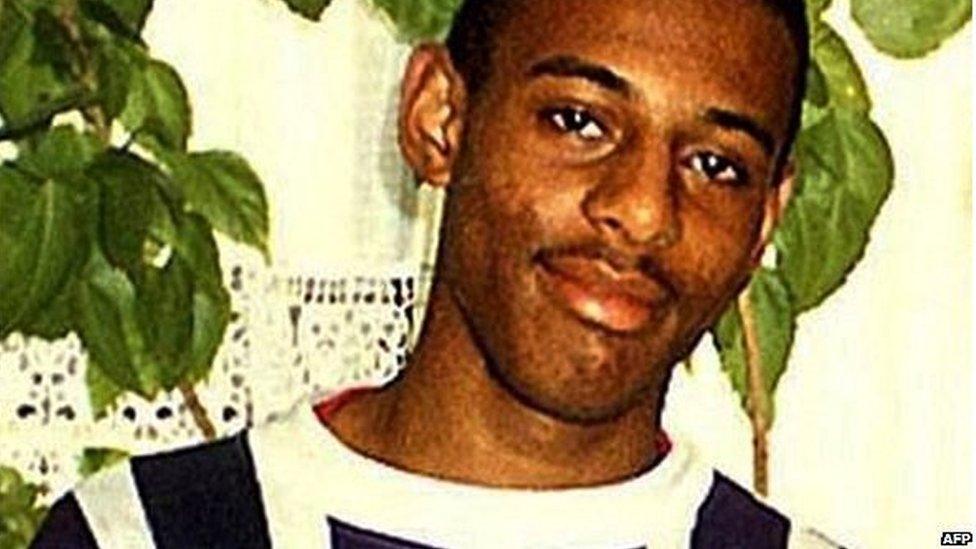
- Published6 March 2014
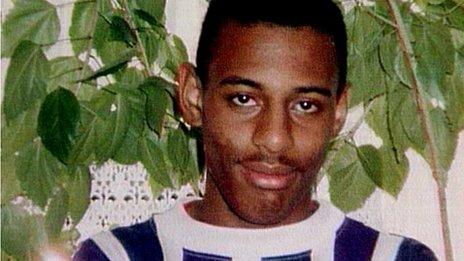
- Published6 March 2014
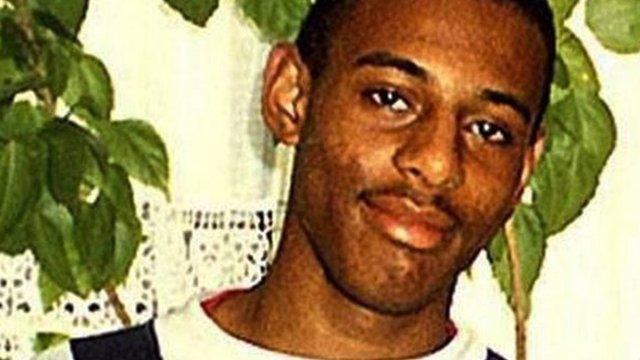
- Published6 March 2014

- Published6 March 2014
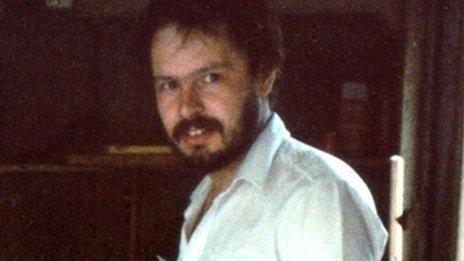
- Published6 March 2014
- Published24 February 2014
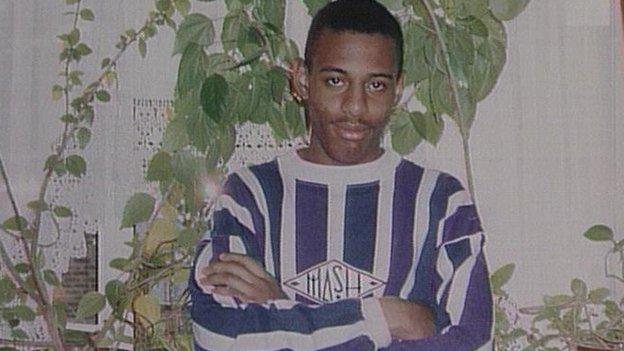
- Published18 September 2013

- Published26 July 2013
